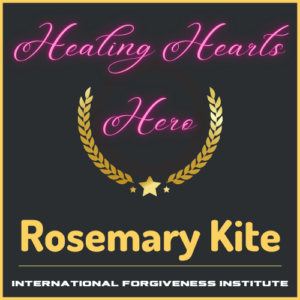Tagged: “break free from the past”
Healing Hearts Hero Award Presented to Rosemary Kite
Rosemary Kite, founder and president of Forgive4Peace (2008-2018), has been selected to receive the International Forgiveness Institute’s (IFI’s) Healing Hearts Hero award. The award recognizes individuals who have developed collaborative partnerships with the IFI and its co-founder Dr. Robert Enright in order to promote the virtue of forgiveness on an international basis.
Formerly called Possumus International, the organization was created in 2008 with what Rosemary calls “the desire to overcome evil through a superabundance of good. And what better good could be provided to the world than instruction on how to exercise mercy towards one another, bridging the way to peace by teaching the importance and value of forgiveness at home, at school, and at work.”
Shortly after its founding, Possumus International (Latin for the words “we can”) became a 2009 Charter Member of the National September 11th Memorial and Museum. Then Rosemary and her colleagues initiated an annual “Family, Friends and Forgiveness” essay competition for girls 10-14 years old with the winners awarded camp scholarships.
In 2013, after learning about and wanting to be a part of the empowering work of the IFI, Rosemary established a “Families and Forgiveness” program that incorporated lessons from Dr. Enright’s A Family Guide to Forgiveness Education into private home settings.
Since then, Rosemary and Dr. Enright have collaborated on school Forgiveness Education projects around the world including those in: 1) Inner City Milwaukee, Wisconsin; 2) Belfast, Northern Ireland; 3) Liberia, West Africa; and, 4) the West Bank, Israel.
Forgive4Peace provided financial support for two IFI-hosted events—the Jerusalem Conference on Forgiveness (2017) and the Rome Conference on Forgiveness (2018). In July, Rosemary was an active participant at the International Educational Conference on Agape Love and Forgiveness in Madison, WI, that was hosted by the IFI and attended by 160 educators from the US, Northern Ireland, Taiwan, Israel, Spain, and the Philippines.
 “Rosemary is a fabulous ambassador for forgiveness who has continually impressed me from the first day I met her,” according to Dr. Enright. “She is constantly trying to raise awareness of the importance and value of forgiveness in one’s everyday life. She definitely knows how to heal hearts through forgiveness.”
“Rosemary is a fabulous ambassador for forgiveness who has continually impressed me from the first day I met her,” according to Dr. Enright. “She is constantly trying to raise awareness of the importance and value of forgiveness in one’s everyday life. She definitely knows how to heal hearts through forgiveness.”
In her 2019 guest blog for this website, The Art and Science of Forgiveness, Rosemary wrote:
“The art and science of forgiveness suggests that the best medicine we can possibly take to improve our physical, psychological, social, and spiritual health, is forgiveness. Forgiveness is like the pill that offers the deepest healing of the wounds that fester in the human heart.”
Elsewhere she says: “As everyone who has ever had to forgive knows, every act of forgiveness begins with an injustice. We have wounded hearts all around us, everywhere we go. Why not try to be a healing heart to those we come across in our paths daily?”
Rosemary, who has a BA from California State University in San Francisco, has devoted her professional career to educational endeavors in the non-profit sector, primarily through the education of women and girls.
Agape Love and Forgiveness Conference Speaker Videos Available in Four Languages
Speaker videos from the International Educational Conference on Agape Love and Forgiveness, held July 19-20, 2022, in Madison, Wisconsin, USA, (funded by the John Templeton Foundation) can now be viewed online absolutely free in four languages–Arabic, English, Hebrew, and Mandarin–using the links below.
The 26 professionally produced presentations feature educators from Northern Ireland, Israel (both Hebrew- and Arabic-speaking), Taiwan, the Philippines, and the US. They describe their experiences teaching agape love and forgiveness to their 5th grade students and outline creative Forgiveness Education teaching techniques.

It seems to me that a safer approach when treated unfairly is to engage in Cognitive Behavioral Therapy and not forgiveness. Forgiveness invites an unwanted guest back into the heart. Cognitive Behavioral Therapy, in contrast, helps me to think in new ways so that I do not condemn myself for letting the injustice happen and it helps me keep my distance from the one who hurt me.
Research does show that Cognitive Behavioral Therapy as a psychotherapeutic technique can be helpful in changing one’s attitude toward difficult situations, but it may not be as effective as Forgiveness Therapy in getting rid of the elephant in the room which is deep, excessive anger that just won’t quit. Forgiveness Therapy has been shown to be very effective against the effects of trauma suffered because of others’ injustice. Forgiveness Therapy can take time and is a struggle because you are growing in the important virtue of having mercy on those who did not have mercy on you. Yet, the effort is worth it because the toxic anger can be reduced and eliminated. Some residual anger can remain, but it does not control the one who forgives.
Sorry for being so blunt, but it seems to me that forgiving is an act of slavery to the ones who behave badly. It gives the unintended message that I am too soft in my response to the one who hurt me. What do you think?
I think you are equating forgiving and automatically reconciling without asking anything of the one who hurt you. As you forgive, you can and should ask for fairness.
Speed and Forgiveness
I will try to be brief.
Speed. You can see it in the driving as the very rare few people actually adhere to the posted speed limit these days.
Speed. You can see it as you watch people walking on the street, phone in hand, scrolling, scrolling, scrolling. I wonder how long the average person stays on one topic within that phone.
Speed. Have you noticed the new trend on Facebook?: reels. These are, what?, maybe 10 seconds each? 10 seconds to view a video…….
Speed. Have you seen those commercials on the Internet, promising you weight loss at night as you sleep if you take a certain kind of pill? At night? With no exercise? And immediate results?
Speed. I have seen such statements as, “Forgive in 6 easy steps.”
Speed. It is in contradiction to what it means to grow as a person. To grow as a person is to slowly improve in the virtues, first identified by Plato as justice, or giving your best with your gifted qualities so that the community is better off and in harmony with others. This takes time to develop your gifted qualities. Forgiveness, as a moral virtue, is crafted with three things: practice, practice, practice. It takes effort and time and struggle to be good to those who are not good to you. It even takes time to deeply understand what forgiveness is and what it is not so that you do not confuse it with excusing wrongdoing or automatically reconciling or throwing justice under the bus. There is no such thing as the forgiveness pill that will reduce resentment as you sleep.
Speed and forgiveness. I have come to realize that they are not compatible and so I am concerned about the new norms of speed, shifting focus quickly, and a lack of required attention. The new norms may be getting in the way of our forgiving well and therefore of living well with others.
I say in my classes at the university: Whenever you try to improve something, you always create a new problem. Do not see only the improvement but also scrutinize the new problem to see if the new improvement is worth embracing. We have quickened our world as we get to destinations faster by car, as we see what presents our friend in a distant land got in the birthday party today, as we are entertained with a 10-second video……..but what is the problem created? We are in danger of becoming way too superficial, way too unfocused, way too unchallenged, and miss perseverance, miss growing in the moral virtue of forgiveness, and miss the golden opportunity of growing in our humanity and in assisting others in such growth.
Speed has its place. It just should not have primacy of place.
![]()








